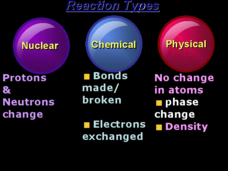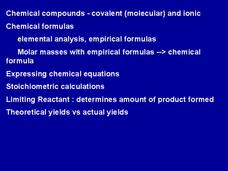Curated OER
Chemistry Slide Collection
A huge slide show provides a review of almost every topic there is to cover in basic chemistry! Your young scientists will be interested to see each illustration and example given. The appearance of the 120 slides varies greatly, most...
Curated OER
Sorting Plastics For Recycling
First, young chemists practice polymer identification by density and flame tests. With the data collected, they propose a method of separating polyethylene from other plastics and determine what property makes it desirable for recycling....
Curated OER
Science Puzzlers, Twisters, and Teasers: Chemical Bonding
What a cute approach to chemical bonding! Atoms all have human names and are attending at a dance. Who will pair up with whom? By reading the characteristics, and not the element name, chemistry whizzes figure out the bonding pairs....
Curated OER
Covalent Bonding
Using chlorine as the model to demonstrate the structures and representations, this PowerPoint clearly labels and details the main atomic structures and reasons for bonding. The electrons in the outer shell are diagramed and then the...
Curated OER
The Building Blocks
This PowerPoint is a comprehensive review of all the facts related to an atom's basic structure and function. What makes this unique is that it is geared toward an audience of junior geologists. After introducing the periodic table of...
Curated OER
Bond Type
At the top of the page are a reading passage and colorful diagram that depicts the tug-of-war that occurs between bonding molecules due to electronegativity. High school chemists fill in a chart with electronegativity values, the...
Curated OER
Bond Energies
Before completing this worksheet, chemists are supposed read a portion of their textbook. Assign the chapter on bond energies, endothermic, and exothermic reactions. Then have your class answer the questions and fill in the data tables...
Curated OER
Why and How Atoms Combine
Here is a top-notch handout to supply your chemistry class with. It covers valence electrons, Lewis diagrams, the octet rule, and more! Technically it is less of a worksheet than a detailed explanation of these chemical bonding concepts....
Curated OER
Unit 3 Bonding
An organized table charting the different types of chemical bonds arrays this resource. The octet rule, ionization energy, and the naming of compounds are also reviewed. Young chemists answer review questions in multiple choice fashion....
Curated OER
Practice Final
A full-fledged practice final prepares pupils for their general chemistry final exam. If they complete these 57 multiple-choice questions correctly, they will be well-prepared. Note: even though the questions are multiple-choice, there...
Curated OER
Chemical Compounds
Your young chemists will find these slides very informative. Groups and periods of the periodic table are labeled and described according to the charge. Comprehensive explanations of physical and chemical properties and how they relate...
Curated OER
Sample Midyear Examination (Chemistry and Biology)
A 12-page midterm exam sample can be given to young scientists in preparation for an exam. This particular installment is geared toward a class that delves into both ecology and chemistry concepts. There is no way to separate the 50...
Curated OER
Periodic Table
In this periodic table and elements learning exercise, students review valence electrons, octet rule, oxidation number, and the difference between metals and non-metals on the periodic table. This learning exercise has 5 matching, 20...
Curated OER
Ionic, Covalent, and Metallic Bonding
You may want to make a few changes before sharing this slide show with your chemistry class. For one, remove the bright blue swirly background that makes the black font hard to read. Ionic bonds are described with the use of an electron...
Curated OER
Building Blocks of Matter
Middle schoolers view videos and worksheets and construct a model of a water molecule. In this atomic structure lesson plan, students view video clips and handouts about matter and nanoscience. They construct a model of a water molecule...
Curated OER
What is a Compound?
In this compound worksheet, students will write down 1 example of a compound and will then write in 3 specific details to support their example.
Curated OER
Chemical Reactions
In this reactions worksheet, students state the differences between a coefficient and subscript and an exothermic and endothermic reaction. Students review the different types of reactions. This worksheet has 13 short answer questions.
American Chemical Society
Middle School Chemistry: Lesson Plans: Temperature Changes in Dissolving
Media-rich lesson in which students discover that it takes energy to break bonds, and that energy is released when bonds are formed during the process of dissolving. They also determine whether dissolving is either exothermic or...
American Chemical Society
Middle School Chemistry: Energy Levels, Electrons, Ionic Bonding
Students discover that ionic bonding occurs when electrons are transferred from one atom to the other and not shared as in covalent bonding.
Nobel Media AB
The Nobel Prize: The Nobel Prize in Chemistry 1954
Read about Linus Carl Pauling (1901-1994), the recipient of two Nobel Prizes, and his research into the nature of the chemical bond which earned him recognition in the world of chemistry.
American Chemical Society
Middle School Chemistry: Lesson Plans: What Is a Chemical Reaction?
After observing a demonstration of a chemical reaction between a burning candle and the oxygen in the air, students use atom model cut-outs to model the reaction and see that all the atoms in the reactants show up in the products.
Concord Consortium
Concord Consortium: Stem Resources: Chemical Bonds
By working through this web-based activity, students differentiate between ionic, non-polar covalent, and polar covalent bonds. Specifically, distinctions are made between bonding types based on orbital shapes and electronegativity...
American Chemical Society
Middle School Chemistry: Chapter 4: The Periodic Table and Bonding
Six middle school chemistry lessons about the periodic table and bonding complete with handouts and animations.
American Chemical Society
Middle School Chemistry: Energy Levels, Electrons, and Covalent Bonding
Students discover the concept that two atoms can attract and form a covalent bond.





















